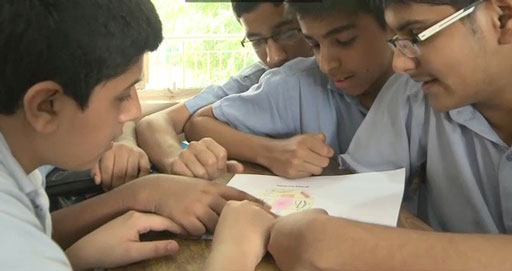4 Speaking and listening in science
Students learning any new language need a chance to practice speaking it and listening to it. This is also true when your students are learning the language of science.
Case Study 2: Key word conversations
Mrs Gupta recounts a lesson where her students played a speaking and listening game using key words.
My classroom is a very quiet place. I am very proud of this. One day there was a big disturbance coming from the classroom down the corridor. I went in to complain because I could not hear myself speak. I was quite shocked at what I saw – but not in a bad way. Teacher Padam explained what he was doing and why. I liked what I saw so much that I plan to try this idea out very soon with my own students. This is what he told me:
Mrs Gupta, I need to make sure that all my students have the chance to practise using the key words in conversations in the classroom. I think this will help them to understand the scientific ideas better.
I thought of a game that we can play for five minutes at the end of each lesson, which is what you seeing now. I give a definition of a key word and ask for a volunteer to tell me what the word is. Each time, the person who guesses the word has to provide a definition for another one. It also works well the other way round. One student chooses a word and they nominate someone else to give a definition.
It means that all my students have the opportunity to hear and use the key words.
One of my students, Sanjay, suggested an alternative, which is also good fun. Write all the words on separate pieces of paper and put them in a bowl. Invite someone to pick a word from the bowl. The other students have to ask them questions to try and guess which word they had picked, but they can only answer ‘yes’ or ‘no’.
There are many other word games that you could play with your students. The unit on ‘Using games’ has more ideas. Games can be very motivating and give students the opportunity to learn. Often they do not realise that they are learning as it is good fun. Word games provide a good opportunity for students to talk about science. This will help their understanding. You can find more information in Resource 2, 'Talk for learning'.

If your students are finding it difficult to pronounce scientific words, you could always encourage them to practise and record themselves on a mobile phone. They could listen to each other's recording and provide feedback.
3 Scientific words with dual meanings
